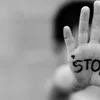Delhi-based Breakthrough India is shattering gender discrimination through innovative campaigns
Founded by Mallika Dutt in 2000, Breakthrough India is working to help people raise their voice against gender bias and violence using music, multimedia, theatre, and pop culture.
Murailapur is a small and sedate village located in Uttar Pradesh’s Jaunpur district. The young girls residing in the area were no different from the others across the country, except for one facet – they had an innate interest to play cricket.
Unfortunately, they had to put up with a whole lot of gender discrimination, sexist attitudes, and societal constraints to engage in the gentlemen’s game. However, the girls overcame it all.
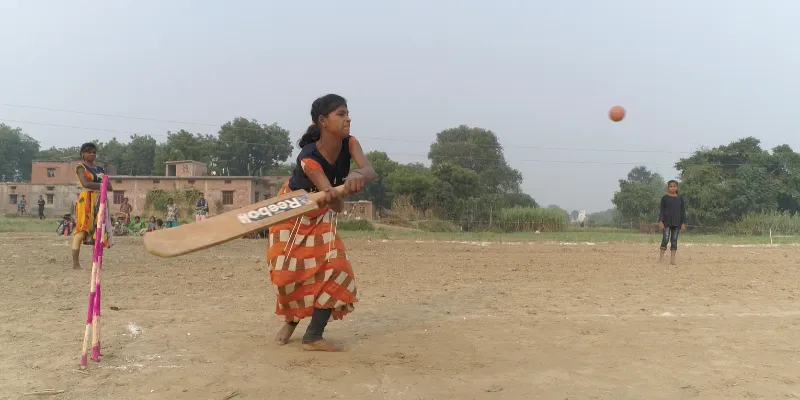
Girls playing a game of cricket in Murailapur, Uttar Pradesh.
“At first, our parents did not let us play cricket. They told us that it is a sport meant for boys only. Later, we convinced them by laying emphasis and talking about gender neutrality. Even the boys in the village stood in our way, saying they would beat us up if we tried. Nevertheless, we never gave up. And, today, we are envisioning a new sense of freedom. The behaviour of the community has also changed,” says captain and bowler of the village cricket team 15-year-old Sanjana Chauhan while sharing her experience of battling the prejudice.
This was made possible by Delhi-based women’s rights organisation Breakthrough India which is working against gender bias and violence. Founded by Mallika Dutt in 2000, the NGO uses various mediums like digital media, music, storytelling, theatre, and pop culture to educate citizens, especially women, about their rights and responsibilities.
Breakthrough has organised multiple campaigns and programmes surrounding domestic violence, sexual harassment, early marriage, and other unjust treatments, as well as social evils.
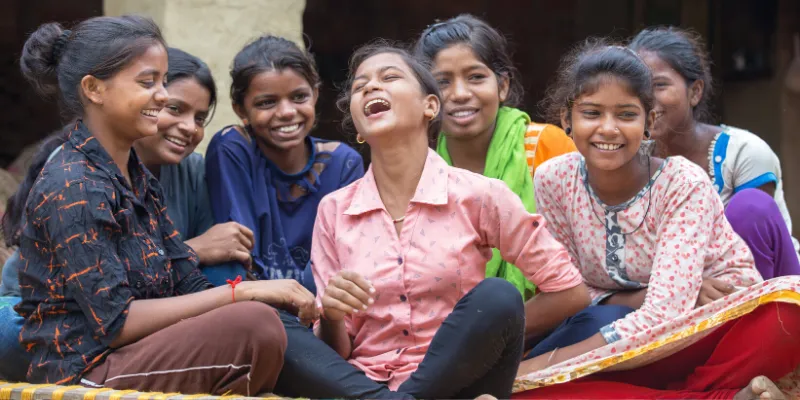
Breakthrough India encourages people to stand up for their rights.
While the NGO’s social media crusades urged millions of individuals to talk about gender disparities, its school-level projects helped over 18,000 adolescents across 150-plus schools to understand the same.
“All our campaigns and activities are developed to make people aware of human rights violations in a language that they can relate. Since its inception, Breakthrough has infused a sense of accountability to prevent gender discrimination majorly among communities living in Delhi, Haryana, Uttar Pradesh, Bihar, and Jharkhand,” Sohini Bhattacharya, President and CEO, , tells SocialStory.
Off to a musical start
Breakthrough India Founder Mallika Dutt completed her Masters in International Affairs and Law from Columbia University and New York University School of Law, respectively. After working with multiple NGOs, in 2000, she decided to quit her job as the Human Rights Programme Director at the Ford Foundation, to establish Breakthrough India.
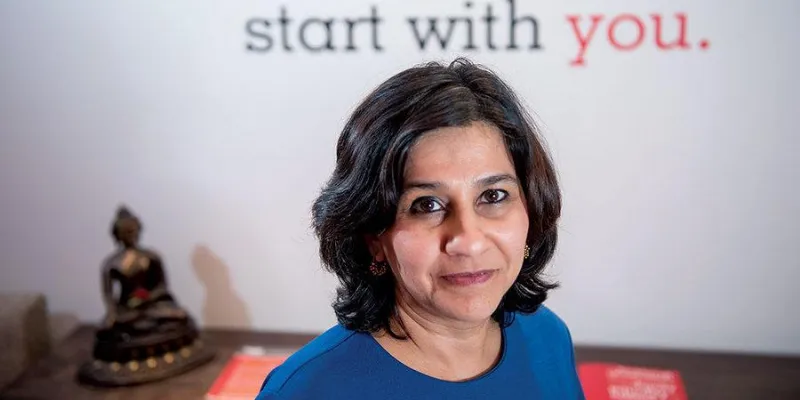
Mallika Dutt, Founder, Breakthrough India.
“During the initial phase, she borrowed money from friends and acquaintances to fund the operational costs. Subsequently, once the organisation started scaling up, funds were obtained from corporates, grants, and other funding agencies such as IKEA Foundation, Google, Azim Premji Philanthropic Initiatives, United Nations Trust Fund and C and A Foundation,” explains Sohini.
Mallika’s efforts eventually bore fruit with the launch of a music album called ‘Mann Ke Manjeere’ — a blend of Indian folk and western chords — that highlighted the myriad aspirations of women in the 20th century. The album, which won the 2001 National Screen Award, was composed by Shantanu Moitra and voiced by singers like Shubha Mudgal, Antara Chowdhury, and Mahalaxmi Iyer.
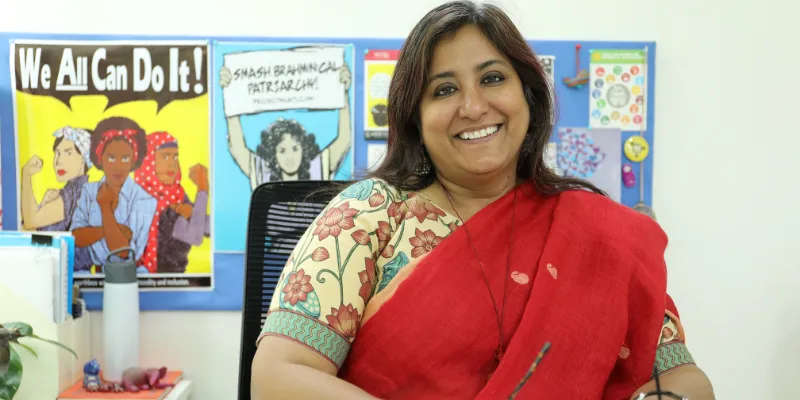
Sohini Bhattacharya, CEO and President, Breakthrough India.
Thereon, there was no looking back for Mallika or the NGO. Gradually, Breakthrough began leaving an indelible imprint on people’s minds. It floated many more music videos like Babul, Baagon Na Jaa, events, as well as film festivals. In fact, it also laid the foundation for public movements and campaigns in 2005.
Crusade against discrimination
Some of Breakthrough’s elementary campaigns were focussed on changing the society’s attitude towards HIV/AIDS. With campaigns titled, ‘What Kind of Man are You?’ and ‘Is This Justice?,’ the NGO encouraged male counterparts in the community to reflect on safe sex and threw light on the inequalities faced by women who contracted the disease.
“We received a tremendous response from the audience for both these endeavours. Almost 32 million people were made aware of the prejudices surrounding HIV/AIDS at the end of it,” quips Sohini.
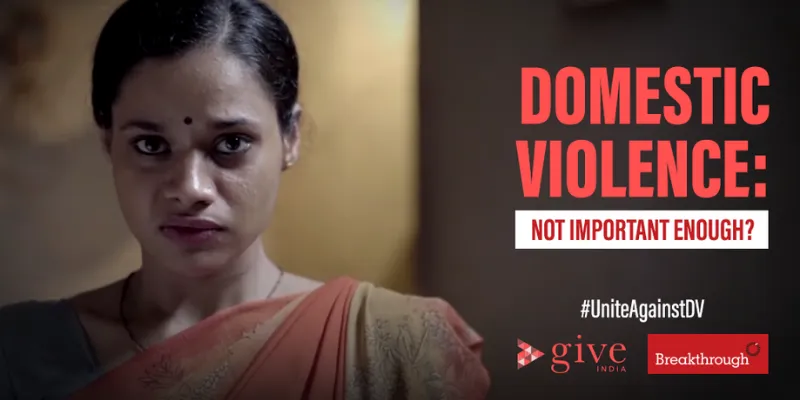
A poster designed by Breakthrough India for its campaign against domestic violence.
Another well-received campaign was ‘Bell Bajao,’ in collaboration with the celebrated advertising agency Ogilvy and Mather. Aimed at encouraging citizens to interrupt incidents of domestic violence by ringing the bell, it involved launching a series of public service announcements (PSAs). The message surrounding the drive was telecasted on Doordarshan, as well as taken to the grassroots through video vans, street theatres, and games. The effort culminated in a 15 percent increase in women filing cases against their abusers.
“After the success of Bell Bajao, we continued to keep nose to the grindstone to create and promote a slew of other initiatives surrounding skewed sex ratios, victim-blaming, early marriage, online harassment, violence in workplaces, and more. The usage of multimedia, art, and culture helped us connect with large audiences, and also witness behavioural changes in them,” notes Sohini.
Training adolescents at the school level
Considering the fact that thought processes and demeanours associated with gender get formed at an early age, Breakthrough decided to develop an intervention called ‘Taaron ki Toli’ in 2014.
The programme is focused on instilling positive values and attitudes among young boys and girls studying in government schools. Though the pilot phase was started in a few districts of Haryana with the support of the state’s education department, the programme is now operational in other Indian states like Jharkhand, Bihar, Uttar Pradesh, and Delhi.
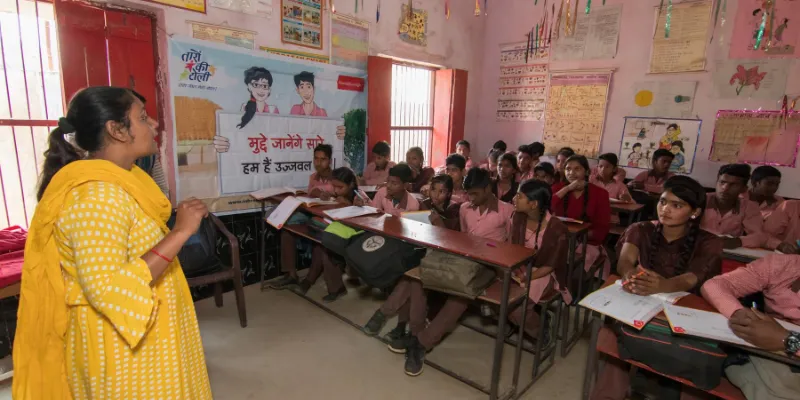
A classroom session in progress as part of the Taaron Ki Toli programme.
Implemented in partnership with the Abdul Latif Jameel Poverty Action Lab (J-PAL), the initiative imparts knowledge about gender, sexuality, legal rights, and adolescent empowerment in a safe and facilitative environment.
“We appoint trainers to teach adolescents between 11 and 18 years about gender equality, interpersonal relations, legal rights, reporting violence and discrimination, building careers, and taking community action. The duration of the entire programme is two years, consisting of 28 classrooms and 12 assembly sessions. Taaron ki Toli is integrated with the daily schedules of students,” adds Sohini.

The organisation using mobile vans to spread awareness in rural communities.
According to the survey and evaluation conducted by J-PAL, the Taaron ki Toli programme met its goal of shaping gender-equitable behaviour among school children. The results revealed that the programme led to an improvement in the career ambition of girls, perceptions of community gender views, awareness levels of the adolescents, and an overall 16 percent rise in gender-equitable outlooks.
To execute all its programmes effectively, Breakthrough ties up with service providers, opinion leaders, non-governmental organisations, local government bodies, and other stakeholders who hold the vision to build a world driven by equality.
When asked about some of the major hurdles faced along the journey, Sohini says,
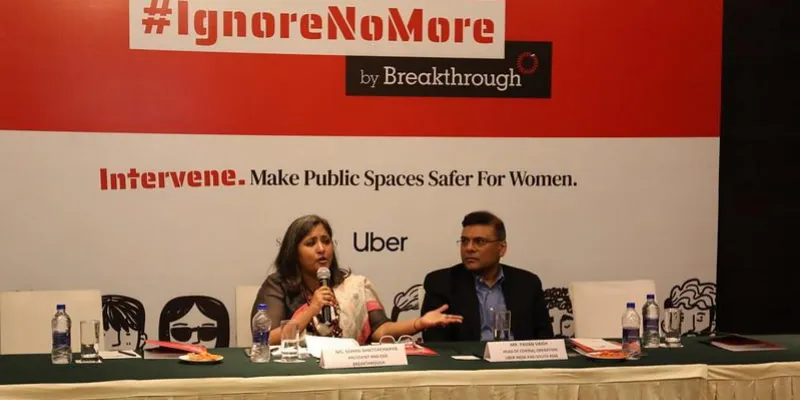
Breakthrough India is all set to launch a campaign in partnership with Uber.
“In the beginning, there was quite a lot of resistance from the community, especially when it came to people residing in rural areas. So we had to work hard to change some of their patriarchal belief systems and cultural norms.”
Breakthrough India and its team of 150 individuals are planning to release a campaign called ‘Ignore No More,’ along with to encourage bystanders to take action against violent behaviour.
Besides this, the NGO is looking to develop digital training modules for adolescents, and also tackle the post-pandemic effects on gender equality through its interventions.
Edited by Suman Singh


